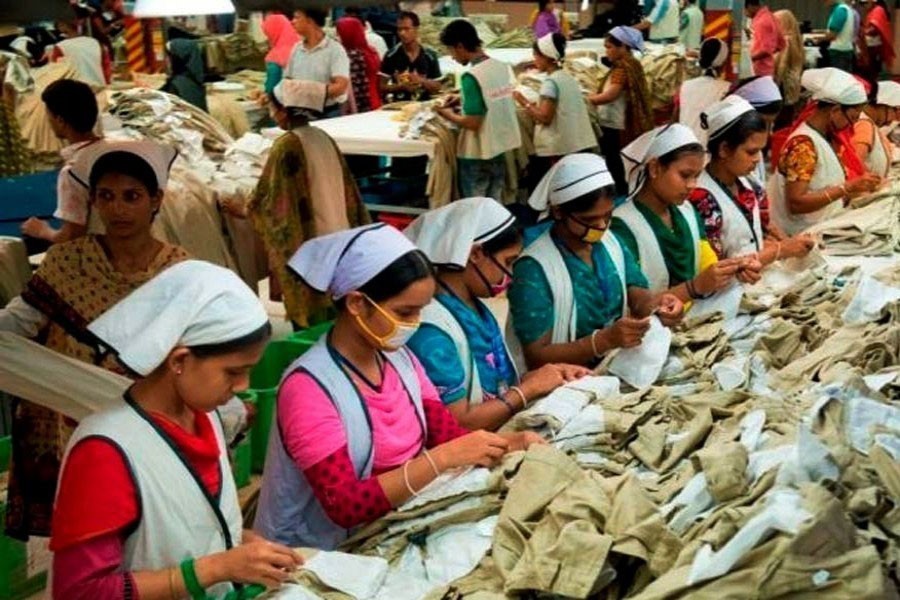
Published :
Updated :

Bangladesh’s apparel units have said many foreign buyers pushed them to an extra difficult situation by trying to undo existing contracts even after product shipments, though financial data suggest the COVID-19 pandemic could not affect much their businesses as speculated, BSS reports.
Several individual Readymade Garments (RMG) unit owners said many retailers were trying to unpick products already shipped or asking for payment discounts as high as 40 per cent saying the COVID-19 pandemic collapsed demand for new clothes.
Some exporters said they were shocked as a few buyers were telling them to cancel orders that were shipped even three months ago, visibly taking advantage of their upper hand in their relationships with manufacturers.
They said several buyers came up with an unexpected gesture while major brands earlier backed off from proposed deals, risking livelihoods of millions in supply chains.
International business and rights watchdog Business and Human Rights Resource Centre in a report earlier this week substantiated the RMG factory owners’ outcry, saying that Bangladeshi clothing manufacturers lost out on more than US$3 billion in payments for garments “already produced or sourced” since March.
Several major western retainers and global financial data, however, suggested their business went well at least in the first quarter of the current year.
“I sent the shipment worth US$ 6.0 million for Transform Holdco LLC but the company suddenly called me for cancelling the order,” Chattogram based Combined Apparels managing director Rakibul Alam Chowdhury told the state-owned news agency.
He added that the Transform Holdco LLC, a newly-formed concern of US-based Sears Holdings Management Corporation, also put some two dozen Bangladeshi garment manufacturers in deep trouble by withholding or cancelling orders.
“The buyer (Sears Holdings) is not paying us worth around $50 million,” Chowdhury said.
Another reputed brand Debenhams of United Kingdom (UK) left about 35 Bangladeshi suppliers in big trouble as it already filed a bankruptcy petition.
Manufacturers said the brand has about US$69 million liabilities to its Bangladeshi suppliers as cost of shipped goods, ready goods and fabrics, plus accessories.
Of the amount, about US$26 million is worth of goods that have been released by now and about $6.0 million is worth of goods already unloaded at UK ports but not yet received by the buyer, they said.
And, of the rest amount, they said, about $7.0 million is worth of goods that are ready for shipment and about $30 million is worth of raw materials that have been procured by the suppliers.
According to Bangladesh Garment Manufacturers and Exporters Association (BGMEA), apart from Sears and Debenhams, other reputed brands, which scrapped or withheld orders or demanded discount, included H&M, GAP, JCPenney, Primark, Arcadia Group, Peacock, Topshop, Dorothy Perkins and Miss Selfridge.
BGMEA officials said Swedish retail giant H&M virtually made a U-turn from its earlier commitment of not cancelling any order while the company sourced apparel items worth over $3.0 billion from Bangladesh last year.
They said H&M cancelled order of 34,500 pieces of apparel items which it had given to Ananta Garments, which also faced order cancellations from US retailer Gap.
“Cancellation of orders after shipment appeared as an enormous trouble for us as now port and shipping lines are demanding demurrage,” said Windy Apparels managing director Mesbah Uddin Khan describing actions of buyers like Sears Holdings’ concern as “horrible” and “beyond business ethics”.
Nafis Udoula of Impress Tex and Composite Limited said all buyers, however, “do not behave in similar ways and that is why some factories have been running well”.
“When 30 to 40 per cent buyers don’t comply with agreements, the manufacturing factories fall in trouble and that has already happened with many suppliers,” he said.
Udoula sought government supports to manufacturers in facing the buyers through legal means as they alone appeared helpless in pressurising them.
The manufactures wondered if the COVID-19 really affected their western retailers to an extent when they could not pay for the goods they had received.
US retail giant Walmart has reported an increase of US$10.7 billion in revenue, or 8.6 per cent, taking its total revenue to US$134.6 billion for the first quarter. Walmart’s US e-commerce sales grew 74 per cent.
The global financial data of first quarter demonstrated several other western brands like Target Corp also gained good amount of profits as its total sales grew by 10.8 per cent in the three months up to May 02, reflecting comparable digital sales growth of 141 per cent.
BGMEA, meanwhile, claimed the owners paid 97.5 per cent of workers for the month of April till May 22 though they were not paid by their buyers in many cases.
BGMEA said most of the apparel factories paid their workers ahead of Eid as Prime Minister Sheikh Hasina earlier announced bailout or stimulus package of Tk 50 billion (over US$5.3 billion) for export-oriented industries to help them out.
The RMG manufactures’ apex body said the factory workers already received their wages as banks disbursed loans for paying wages of April from the government’s stimulus package.


 For all latest news, follow The Financial Express Google News channel.
For all latest news, follow The Financial Express Google News channel.